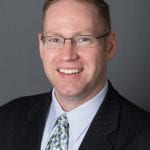The term “lifelong learning'” has gained a lot of currency in recent years, but what does it really mean? A standard definition is that it is a form of self-initiated education focused on personal development. Learning, of  course, takes place in many ways and places: on the job, in formal educational programs, with or without academic credit, and in personal and professional networks. I recently had a chance to speak with Andy Covell, SHRM-SCP, a student who exemplifies what it means to be a lifelong learner. A master’s candidate who will receive his degree in May 2023, Covell also models the HR professional’s role in promoting learning.
course, takes place in many ways and places: on the job, in formal educational programs, with or without academic credit, and in personal and professional networks. I recently had a chance to speak with Andy Covell, SHRM-SCP, a student who exemplifies what it means to be a lifelong learner. A master’s candidate who will receive his degree in May 2023, Covell also models the HR professional’s role in promoting learning.
Carl Zangerl: Tell us a little about your professional background and your involvement with Society of Human Resources Management.
Andy Covell: I started in HR when I moved to San Diego in 2003. I was the safety and compliance manager at a large downtown hotel. Since then, I’ve had a number of different roles in both large and small organizations, in the private sector and supporting the U.S. Department of Defense. The experience has given me a broad perspective on HR dynamics within a range of settings. I also founded my own HR consulting firm, Lion Tech Solutions, through which I help a variety of small businesses as their HR generalist.
My involvement with SHRM is very broad, deep and rewarding, and also goes way back. A friend had encouraged me to get involved with the [SHRM] San Diego chapter as a way to build my professional network. I did and loved it! For a couple of years, I served as the chapter president, and later, I became the district director for CalSHRM [the California SHRM state council], overseeing the Southern California chapters. Now I’m back on the board of the SHRM San Diego chapter as treasurer.
Zangerl: What motivated you to earn your SHRM certification?
Covell: I’m a basically curious person, and the SHRM preparation materials for the certification exam resonated with me. You’re not just memorizing information: You develop the ability to see connections between knowledge and actual situations in talent management and other areas. By earning my SHRM-SCP credential, I’ve enhanced my HR competencies and raised my visibility in the profession.
Zangerl: Northeastern offers applicants to our HR management graduate program the opportunity to transfer credit based on their SHRM certification. Was that a factor in helping you decide to pursue your master’s degree here?
Covell: The short answer is yes, 100 percent! I had looked at other programs. Other factors I considered included alignment with SHRM competencies and, in view of my hectic schedule, convenience. But it mattered to me a great deal that Northeastern places a tangible value on the knowledge I mastered through my SHRM certification in the form of transferred credits. Having my SHRM-SCP saved me 13 percent on the cost of my graduate degree.
Zangerl: Why did you decide to earn your master’s in the first place? You have 20 years of HR experience and other professional certifications.
Covell: I had thought about pursuing a graduate degree for over 10 years and finally decided to take the plunge. In hindsight, it might have made sense to do this earlier in my career. But as I’ve progressed through the course of study, I now appreciate the value of a master’s at this stage in my career. The program has helped me connect the dots, enabled me to apply what I’m learning in real time and taken me to the next level of professional growth. My understanding of the subjects we study, such as workforce analytics and strategic talent management, has been amplified by my prior work experience—and I’ve been able to share my insights with other HR practitioners in the program.
This article is reprinted from the January 19, 2023 issue of the SHRM Certification Newsletter.
Posted by Carl Zangerl, Faculty